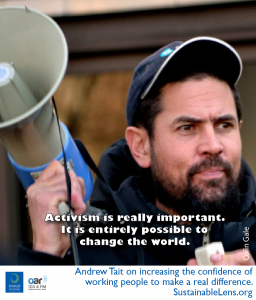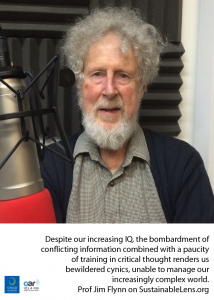Activism is really important. It is entirely possible to change the world.
Andrew Tait is a Dunedin journalist, he is an active member of the EPMU, and the Mana Party, and was involved in Oil Free Otago, and the Otago Occupy Movement.
Talking Points
Possibilities for positive change.
“One law for all” is dog whistle, it’s code word for racism. Our justice system is inherently, systematically racist from start to finish. Maori are more likely to be apprehended, once apprehended they are more likely to be charged, once charged they’re more likely to go to court, once they go to court they’re more likely to be convicted, once they are convicted they are more likely to receive harsher sentences, custodial sentences.
Law and order, one law for all is absolutely the new rhetoric of racism.
(On meritocracy being an abstract that doesn’t work in context) Anyone that’s interested in real change has to recognise where people are really coming from – you can’t approach things from an abstract point of view, you have to work with from actual communities where they really exist, the concrete realities of their lives.
One of the big problems in western society is the rift between ourselves and the environment. It’s to do with urbanisation, its to do with externalisation of costs and the privatisation of profits, and the exploitation – the idea that the environment is there to be used, and the idea that things are there to be used and then thrown away.
The challenge for us is not to fall backwards, but to maintain the level of civilisation, the level of science, in a conscious way, but to restrengthen the natural collectivism of what it means to be a human.
Fundamentally what it means to be human is to be part of humanity, to be part of a group.
We have to work with those we can work with….don’t waste your time with people who aren’t going to listen.
Working class people have got the power to change the world, we create all the wealth and we’ve got an interest in changing the world. That’s a very different point of view than lobbying the powerful – or at least the people who apparently hold the power in the system.
We need to radically change the system.
Everybody has contradicting conscientiousness.
Somebody might have internalised capitalism too much, they might be living alongside us, but they believe the way to get ahead is to knife somebody in the back.
This is not some Utopian future, we’re talking about standards of human decency that we impose on society in general – the idea of the 40 hour week, the idea of free health care, the idea of education…these things were just ideas, until people worked together to make them a reality.
We do need radical change, but we have already won major victories.
My orientation is always towards what increases the power of working people, because what increases the power of the community, increases the safety of the environment. I don’t think you can separate them.
The best guardians of the environment are the people that are living and working there.
We need a movement of confidence,
Activism: Absolutely. Activism is really important. It is entirely possible to change the world. The world is changing all the time and what we do can make a real difference – so much of what we have has been won by people working in the past.
Challenges: Building an organisation of activists, of people committed to responding. Strengthen the ability, the self confidence of working class people…to fight for rights for the oppressed.
Advice: Study. Our culture is quite instant, it doesn’t encourage thoughtfulness, if you can join a union join it , look after one another but look for big changes as well.


